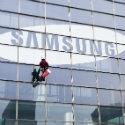
SmartThings, the home automation company founded in 2012, is independent no more. News surfaced late Thursday that Samsung has purchased the startup for an estimated $200 million.
With the SmartThings deal, Samsung Corp. nets 55 new employees, a slate of devices supporting applications like home security and energy management, and a smart home platform to rival technology from Apple Inc. (Nasdaq: AAPL), Google (Nasdaq: GOOG) and many others. On the SmartThings blog, CEO Alex Hawkinson outlined the advantages for his team.
"We believe that there is an enormous opportunity to leverage Samsung's global scale to help us realize our long-term vision," Hawkinson wrote. "While we will remain operationally independent, joining forces with Samsung will enable us to support all of the leading smartphone vendors, devices, and applications; expand our base of developers and enhance the tools and programs that they rely on; and help many more people around the world easily control and monitor their homes using SmartThings."
Major companies are approaching the smart home market from a number of different angles. Apple and Google are hoping to use their developer ecosystems to tie together devices such as connected light bulbs and thermostats with mobile applications. Retailers like Staples, Lowes and Best Buy are partnering with smart home platform companies to sell more connected devices in stores. And cable and telecom providers are rolling out new hardware and software bundles in an effort to sell broadband-based home security and automation services. (See Apple Joins Home Automation Wars and Betting on Smart Homes.)
SmartThings says it remains committed to maintaining an open platform for developers, hardware manufacturers and consumers, and CEO Hawkinson wrote in his blog post that Samsung "fully supports this vision." Regardless of how open the platform is, however, there will ultimately be winners and losers in the smart home technology market. Analysts Cesar Bachelet and Patrick Rusby with Analysys Mason believe that Samsung has an advantage over some of its competitors because it sells home appliances as well as smartphones and tablets.
For more of Light Reading's coverage of IoT trends, visit our IoT content channel.
Ultimately, though, the stakes also extend beyond the home as everyone tries to jockey for position around the Internet of Things. Eventually, it won't only be light bulbs, thermostats and refrigerators that these technology platforms aim to control, but everything from cars to signs to medical devices.
Samsung already has its own IoT operating system called Tizen, but that technology has gained limited traction so far. After speaking with both Samsung and SmartThings, Re/code reported that the two companies see plenty of partnership opportunities on the horizon for the separate technologies.
It will likely take some time for the platform wars to shake out, but in the meantime, Samsung has placed itself squarely on the battlefield with the purchase of SmartThings. Expect a lot more activity on all fronts heading into 2015.
— Mari Silbey, special to Light Reading
About the Author(s)
You May Also Like












